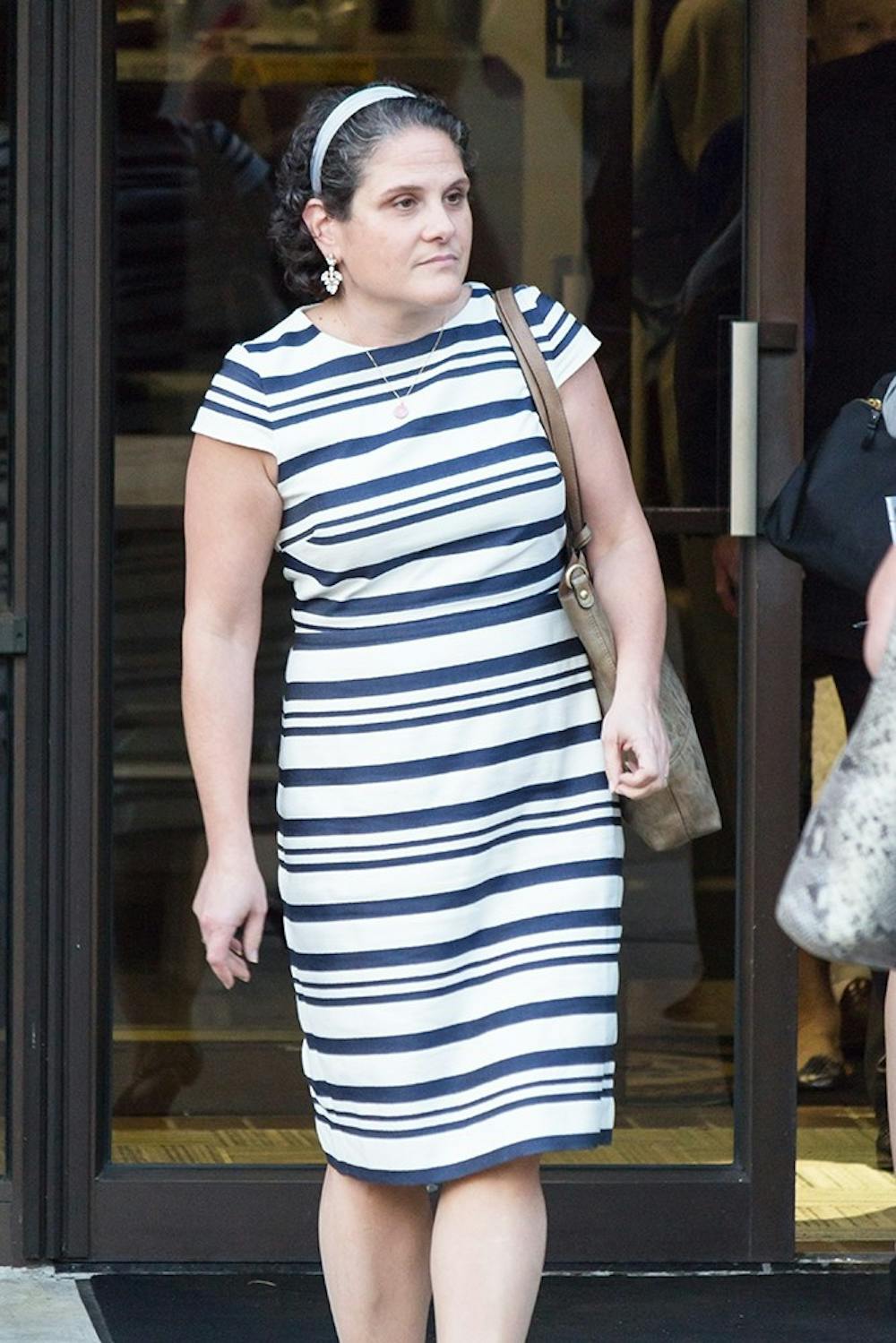Lawyers for both sides presented their closing arguments Tuesday morning in former Associate Dean Nicole Eramo’s lawsuit against Rolling Stone, Sabrina Rubin Erdely and Wenner Media, Inc.
Eramo’s attorney Tom Clare reviewed evidence and testimony to support the claim that Rolling Stone’s story “A Rape on Campus” defamed Eramo.
Clare began his closing statements by refuting the opposition’s argument that the story was meant as a critique of the University’s victim choice policy and campus security.
“This is a case about journalism,” Clare said. “It’s about how Nicole Eramo treated Jackie.”
He went on to claim Rolling Stone ignored the facts in what he called a “quest for sensationalized reporting.”
Erdely and others at Rolling Stone were set on a preconceived narrative of “institutional indifference” at the University, Clare said. He alleged this narrative prompted Erdely and Rolling Stone to ignore student opinions and contradictory facts in the interests of preserving their story.
In an effort to demonstrate Erdely’s preconceived narrative, Clare showed evidence such as emails between Erdely and other Rolling Stone staff, as well as clips from interviews in which Erdely expressed her own negative opinions of Eramo.
“That’s not journalism. That’s push polling,” he said in reference to a recording in which Erdely told a student Eramo’s conduct made her “so f—ing mad.”
Clare also reviewed the problems with the defendants’ complete trust and dependence on Jackie for the focal story of the article. He reminded the jury of Jackie’s unwillingness to allow Erdely to corroborate her story with friends, her resistance to the suggestion of reaching out to her alleged attacker, Drew, and her changing story.
“It was a giant, waving red flag,” Clare said of Jackie’s behavior in interviews and interactions with Rolling Stone.
His closing remarks emphasized the positive student opinions of Eramo that he said Erdely ignored. Clare referenced several students who expressed positive feelings toward Eramo in interviews with Erdely.
“You heard from many of those students directly, and how much they love Nicole,” Clare said.
He added how damaging the article was the student body’s trust in Eramo, saying the article “destroyed that in a minute.”
After repeatedly emphasizing the “intentional decisions” that went into an article that “made Eramo the face of institutional indifference,” Clare finished his statement by asking the jury to hold the defendants responsible for their actions.
Scott Sexton, attorney for the defendants, addressed the jury with his closing arguments after lunch. He highlighted three statements made in the article — Eramo discouraging Jackie from sharing her story, Eramo’s “rape school” comment and her “non-reaction” to learning of other rape allegations at the Phi Kappa Psi fraternity.
The jury must rule in favor of the defendants “if [they] decide any of the statements at issue are actions, statements and issues about U.Va. and not Nicole Eramo personally,” Sexton said.
Erdely was visibly upset and accepted a tissue from Woods as her attorney played a voicemail she had left for Jackie when she began to question the article’s credibility in December 2014.
“She feels extraordinarily foolish for having fallen for this,” Sexton said. “At the end of the day Jackie was the one who gave her those words.”
Sexton emphasized certain provisions of the jury instructions — primarily definitions of actual malice and purposeful avoidance — to convince the jury Erdely was not writing the article with the intent to create a villain out of Eramo. Clare, however, told the jury they are allowed in the instructions to infer actual malice.
In order to rule against the defendants, “[the jury has] to believe these people were harboring serious doubts … and [published] it anyway,” Sexton said.
In his closing argument, Sexton claimed the Office of Civil Rights 2015 report on the University demonstrated a history of noncompliance and the administration’s failure to protect survivors.
“She had created a hostile environment at the University of Virginia for sexual assault victims,” Sexton said. “That was why she was taken out of Title IX work.”
In his rebuttal, Clare reminded the jury of Eramo’s testimony in which she described how she had been asked to hand over all of her Title IX student files the day after the article came out and has not returned to her previous job since.
“That student trust that had built up over those many years was gone,” he said.
Both sides claimed their trust in Jackie was justified. Clare specifically argued it was not Eramo and the administration’s job to question Jackie’s story, but Rolling Stone’s.
“They’re supposed to be skeptical,” Clare said. “They’re supposed to ask hard questions.”
Sexton, in his description of Rolling Stone’s trust of Jackie, said no one expected her to lie to them. He said because some of the facts Jackie had given Erdely were confirmed through conversations with other people, Rolling Stone believed her story to be true.
“We are the ones who stand here and we are the ones being tried, in a sense, for having believed her,” Sexton said.
To end the final closing argument, Clare pointed to Rolling Stone being the perpetrator in the situation by forcing Eramo into the public spotlight.
“I bet they wish it never happened … but they’re the ones that published this to a global audience,” Clare said. “Nicole did not have the luxury of making that decision.”
The trial will continue Wednesday morning with jury instructions and jury deliberation.







